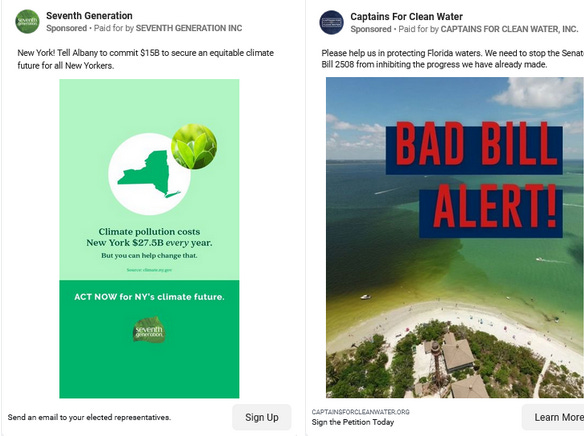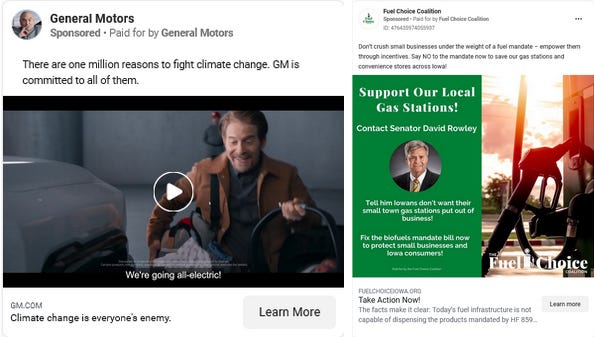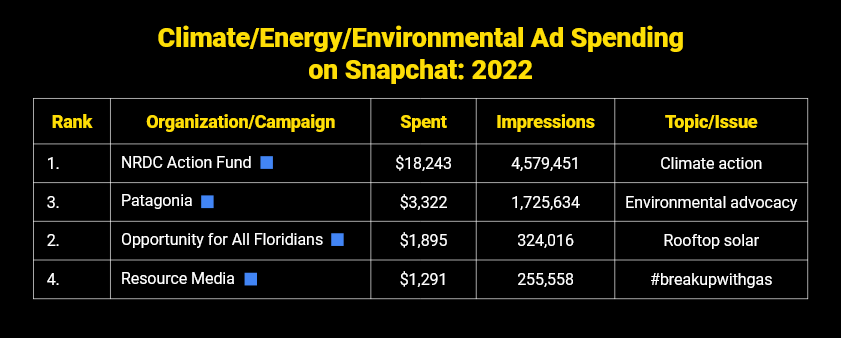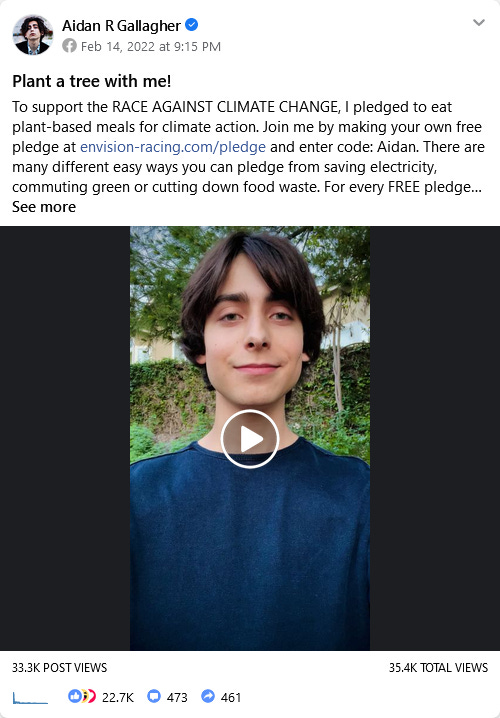GM goes all-in on all-electric in post-Super Bowl Facebook ads
Plus, a look at how digital ads are being used against a wonky bipartisan irrigation bill in Florida
Welcome to Climate Monitor, your weekly digest of the digital tactics and strategies that polluters and climate-action groups are deploying online to shift public opinion and move legislation. We’ve examined political ad spending on platforms like Facebook, Snapchat, and Google by several dozen groups and corporations from the past week, as well as their activities on social media. Tell your colleagues to subscribe here!
What we found:
Climate Power and the League of Conservation Voters both launched very brief Facebook ad campaigns last week advocating for the climate provisions in the Build Back Better Act.
There appears to be a somewhat coordinated effort to defeat a new irrigation bill in Florida, as both Patagonia and Captains for Clean Water are running digital ads raising awareness about the bill.
Among corporate advertisers, Seventh Generation is using Facebook ads to call for New York State to invest $15 billion in climate action, while General Motors spent over $200k promoting its electric vehicles as a way to combat climate change.
There wasn’t significant social media activity around climate change or related topics last week, but climate disinfo is still rampant, according to recent reporting from both Triplecheck and the Center for Countering Digital Hate.
National Digital Ad Spending on Climate
First, here are the top 25 spenders nationwide on climate and energy-related ads on Meta platforms from last week:
Last week, spending on Meta ads declined slightly among climate and clean energy groups, but there were a few groups who increased their spending or otherwise started new campaigns, at both the national and state levels. Among the national groups running new ads on Meta’s platforms is NRDC, which launched a series of acquisition campaigns focused on fighting biomass plants in Wisconsin, banning fracking in the Delaware River Basin (i.e. New York, New Jersey, Pennsylvania, and Delaware), protecting Big Cypress National Preserve from oil drilling, and protecting gray wolves in the Northern Rockies.
Additionally, we picked up a couple brief campaigns supporting the Build Back Better Act from Climate Power and the League of Conservation Voters, both of which only ran their respective campaigns for a few days last week. LCV’s ads exclusively targeted Ohio, New York, and New Jersey, arguing particularly in OH that climate investments will “save $500 a year in energy costs and create good-paying jobs.” At the same time, Climate Power spent most of its Facebook ad budget on a series of ads profiling clean energy workers from Michigan, Georgia, and West Virginia, but the ads exclusively target Washington, DC. We estimate that Climate Power and LCV spent around $12k and $7.5k on these campaigns, respectively.
We also identified a couple of new campaigns operating at a more local level. Seventh Generation, the household goods brand, is targeting ads at young women in New York advocating for the state to “commit $15B to secure an equitable climate future for all New Yorkers.” On the other end of the Atlantic coast, a nonprofit called Captains for Clean Water is running a nationwide Facebook ad campaign gathering opposition to SB 2508, a bill working that has almost unanimous support in Florida’s state house which would essentially prioritize farmers’ irrigation from the Everglades and Lake Okeechobee over the lake's health, among other things. Captains for Clean Water’s campaign is mostly targeted at women younger than 35.
Spending on political ads on Meta’s platforms by fossil fuel groups decreased by 25 percent last week from the previous week, largely due to the fact that ExxonMobil did not run any ads on Facebook or Instagram last week. However, we did notice that General Motors started running ads on these platforms the day after the Super Bowl, pushing various Dr. Evil-themed ads promoting their new electric vehicles to young adults all over the country.
At a more local level, we found that a group based in Iowa called the Fuel Choice Coalition is once again using Facebook ads to oppose a bill that aims to improve production of and access to biofuel in the Hawkeye State. They’re using their Facebook ads to pressure Iowa state lawmakers of both parties to oppose the bill, arguing that “Fuel mandates will cripple our small, local gas stations, and put many of them out of business.”
Overall, here’s a look at how weekly spending on Meta political ads by climate groups and polluters compare week-over-week so far this year:
Google + YouTube
We could not identify any new or ongoing campaigns from climate groups or polluters in the Google Transparency Report from last week.
Snapchat
It looks like Captains for Clean Water isn’t the only group using digital ads to organize opposition to SB 2508 in Florida. Patagonia has spent $421 on Snapchat ads targeting Beachgoers & Surfers, Advocates & Activists, and Outdoor & Nature Enthusiasts in Florida promoting an event discussing the bill’s implications and next steps. They’ve also spent $101 on Snapchat ads advocating for wild bison in Yellowstone.
Overall, here are the top spenders on Snapchat ads related to climate change, clean energy, and conservation so far this year:
Climate, clean energy, and conservation ads in this year’s key states
Out of the biggest races Arizona, Florida, Georgia, Nevada, New Hampshire, Ohio, Pennsylvania, and Wisconsin, we picked up a few new and ongoing Facebook ad campaigns from top candidates:
NC-SEN: Ted Budd is running a pair of ads featuring a graph of “BIDENFLATION”, where the red line that goes up is simultaneously labeled with Energy, Electricity, Food, Gasoline, New Vehicles, Clothes, and Shelter. The ads copy reads, “🚨 FACT: Inflation is up 7.9% in North Carolina! It is a slap in the face to North Carolinians for Joe Biden to continue downplaying the impact rising prices are having on average American citizens when his disastrous policies are the culprit.”
NH-SEN: Maggie Hassan is using Facebook ads to promote local news covering her support of suspending the federal gas tax: “‘We know how hard inflation is hitting our families.’ New Hampshire Senator Maggie Hassan has put out a proposal that will temporarily lower gas prices by suspending the federal 18-cent gas tax through the end of the year. ‘What we should all be focused on is making sure that our families can afford the basics.’ Hassan, who is up for re-election, says it is just one of the ways government can help working families during tough times.”
GA-SEN: Herschel Walker is again using his ads to connect rising prices to the Democratic government, particularly in response to Sen. Raphael Warnock’s recent push to suspend the federal gas tax: “Gas prices are SURGING because of BAD decisions from Democrat politicians like Senator Warnock and President Biden. America cannot depend on other countries for our essential resources, which includes ENERGY. As Georgia’s next U.S. Senator, I’ll FIGHT to make America energy INDEPENDENT again!!”
WI-SEN: Mandela Barnes is once again leaning on climate change, among other issues, to fundraise: “ They’ll do it because this Senate seat is EVERYTHING. This Senate seat is abolishing the filibuster, it’s voting rights, it’s climate change legislation, it’s health care, it’s money in politics, it’s every issue you care about. And our only shot at defeating Ron Johnson is if lots and lots of people make lots and lots of donations to put us over the top.”
Reaching Frontline Communities
LCV spent just under $500 through Chispa TX on a Facebook and Instagram ad campaign encouraging mostly young adults to vote early in next week’s Texas primary elections, which runs from February 14 - 25. The ads take users to the state’s online voter portal, but curiously the campaign itself only ran from February 19 - 22.
Tracking Climate Disinfo Online
Triplecheck’s tracking identified approximately 240 tweets with more than 10 retweets and 100 Facebook posts with more than 10 engagements that contained misinformation or toxic narratives related to the environment from February 14, 2022, through February 20, 2022.
More than seven million people were exposed to this content on Twitter during the time period reviewed, a decrease from last week's exposure levels. The content had over 8,400 engagements on Facebook, a decrease from last week's exposure levels.
Approximately 90 percent of the people exposed to misinformation or toxic narratives related to the environment on Twitter were exposed to one of the following themes:
US climate envoy John Kerry is a hypocrite for flying on private jets;
The Biden Administration is ignoring threats from China and Russia in order to fight climate change; and
Climate change is a hoax.
These narratives were also the focus of approximately 100 percent of the Facebook engagements identified in our tracking. Triplecheck’s full report can be found here.
We’d also like to recommend recent reporting by the Center for Countering Digital Hate, which found that Facebook “is failing to label half of content from leading climate change deniers, including posts that call climate change a ‘hoax’ and calls to ‘alarmist climate propaganda.’”
Measuring the National Organic Conversation
The top three Facebook posts mentioning climate change and related terms last week came from Joe Rogan (98.4k interactions), Barack Obama (25.9k interactions), and actor Aidan Gallagher (23.5k interactions).
Overall, there were very few public posts about climate change and related topics last week that got a significant amount of engagement. For example, the Biden administration last week announced that it would reinstate California’s environmental regulatory authority, but the AXIOS post of the story only got 18.6k interactions, and an Occupy Democrats post about the decision only got 15.5k interactions. Additionally, a post from Josh Mandel post saying “Climate change isn’t a threat to our national security, Joe Biden’s open borders are,” got 15.2k interactions, while a post from President Joe Biden advocating for the climate provisions in the Build Back Better Act only got 14.9k interactions.
The top three Instagram posts mentioning climate change from last week came from Barack Obama, Joe Rogan, and Leonardo DiCaprio. We also picked up an IG post from notorious right-wing grifter Benny Johnson, who took a meme about the futility of private actions (recycling) against the fossil fuel excesses of the rich (private flights after the Super Bowl) and spun it to feed the hypocritical climate activist narrative, getting 61.9k interactions. Otherwise, like on Facebook, there were very few highly engaged posts about climate change on Instagram last week.
That’s it for Climate Monitor this week. As always, head to climatemonitor.substack.com to see these updates in real time as we publish them throughout the week!
And if you have any comments or questions, feel free to drop us a line by shooting an email to nick@fwiwmedia.com.

















